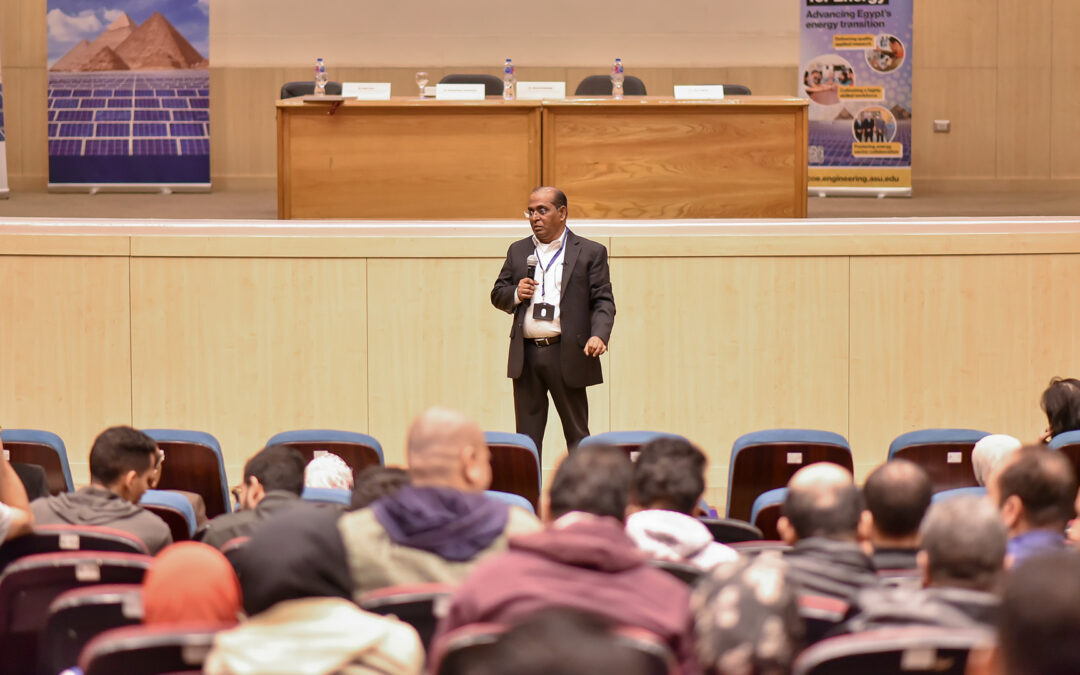Almost 200 energy professionals, faculty, and students attended the U.S. Agency for International Development, or USAID,-funded Arizona State University Center of Excellence for Energy solar photovoltaic, or PV, workshop and certification course. Led by Govindasamy “Mani” TamizhMani, director of the Photovoltaic Reliability Laboratory and a research professor in the Ira A. Fulton Schools of Engineering at ASU, the program aimed to advance understanding of PV systems performance, environmental and economical concerns, reliability and testing. The workshop and certification course were part of the Center of Excellence for Energy’s efforts to increase higher education capacity in the energy sector in Egypt.
The emergence of solar energy is making a significant impact on the future of clean and green energy production. Egypt has initiated several energy sector reforms, gradually moving towards green energy and promoting renewable energy production. The country has increased electricity production over the last five years, ensuring a stable supply across the country, and plans to increase the share of renewable energy in the electricity mix to 42% by 2035.
“In order to reach that goal, there needs to be an increase in higher education capacity in the energy sector. The Center of Excellence for Energy is working closely with Egyptian universities, the energy industry and government ministries in Egypt to develop capacity to support this goal,” says Sayfe Kiaei, project director and a Fulton Schools professor of electrical engineering. “Working with Ain-Shams, Mansoura and Aswan universities, we are developing new curricula in energy engineering, funding new research projects and offering exchange and sabbatical programs for Egyptian faculty and students to come to ASU as well as offering workshops like these to support our Egyptian partner universities in training a skilled workforce that can further Egypt’s energy transition.”
The Center of Excellence for Energy presented multiple workshops on PV systems at Ain-Shams, Mansoura and Aswan universities in December 2023. There were more than 150 participants from the universities, industry and government agencies. The workshops provided an overview of solar energy, its implementations, cost and impact of solar energy and the reliability of solar energy. TamizhMani addressed several practical issues in terms of the development and implementation of the renewable solar system.
The center also organized a solar photovoltaic certificate program, “Testing Standards and PV Product Certification Requirement Course,” which had more than 75 attendees. With TamizhMani’s support, participants explored different testing standards for all components of the PV system and nuances of retesting. The stages of PV product certification were examined as well as the accreditation requirements for certification bodies. Manufacturers also provided participants a holistic understanding of the certification process.
The workshop and certification course were well-received with positive feedback from the faculty, students and energy industry professionals who attended. Attendees say they gained theoretical insights into PV systems and learned practical knowledge in the solar energy landscape.
“The certification program gave me new ideas for my research,” says Seham Abdelsamea, an electronics and communication engineering instructor at Mansoura University. “I am working on a prototype of the technology itself, and the in-depth information on testing devices bridged a knowledge gap between design and fabrication. It helped me factor crucial elements into my designs that will help meet the requirements of the departments responsible for fabrication.”
